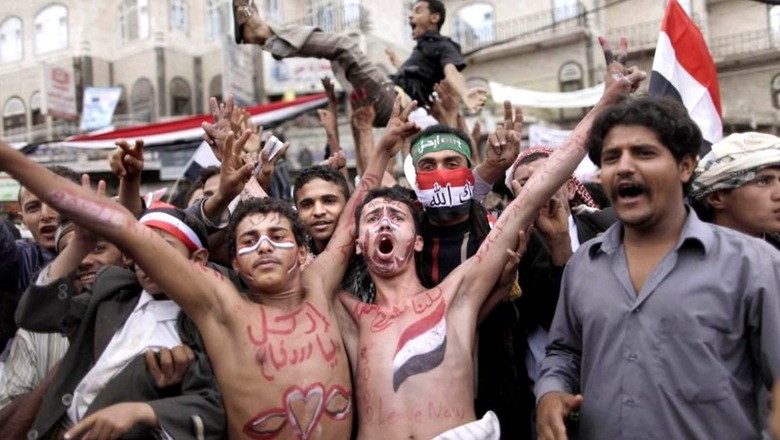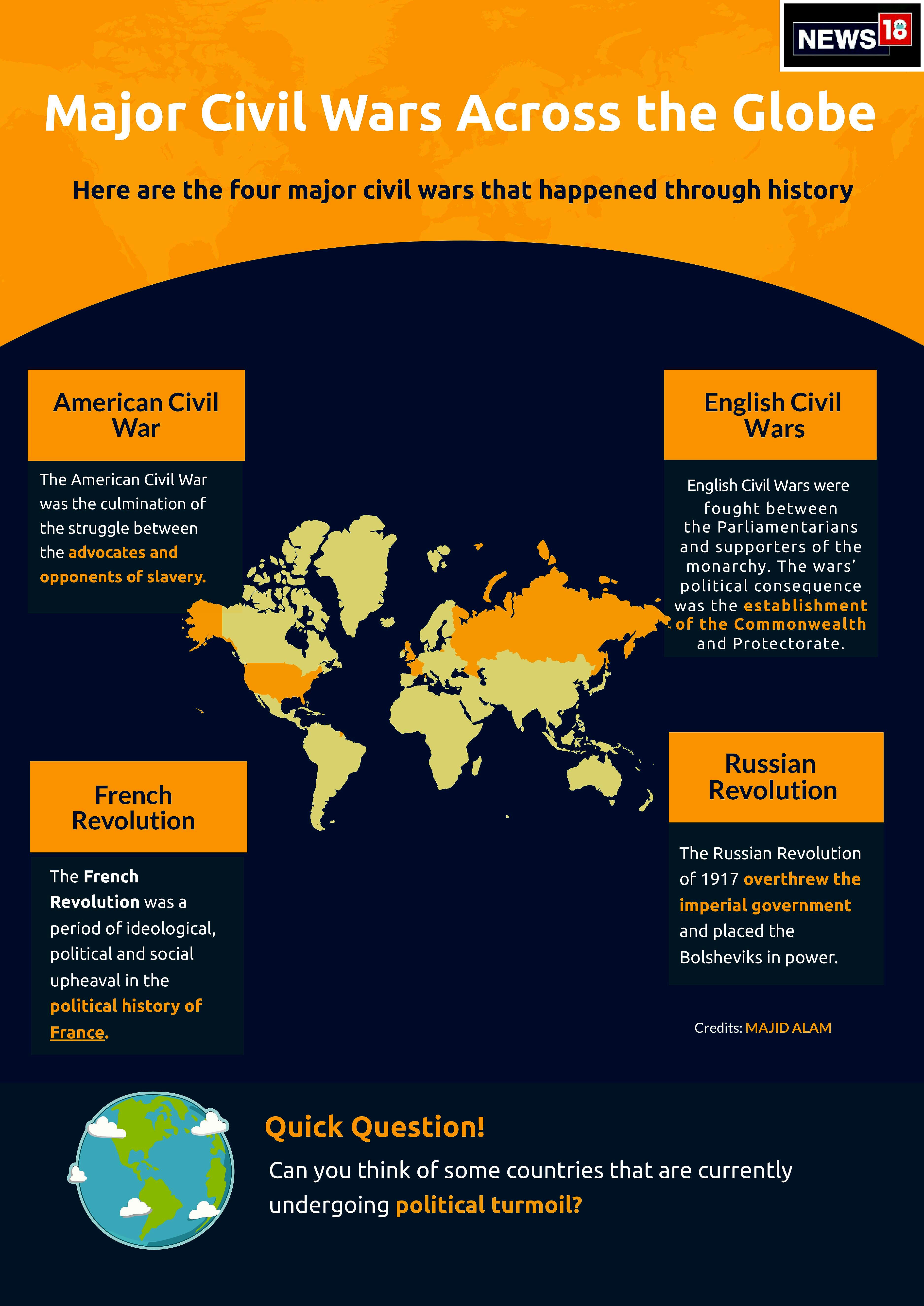
views
There has been an ongoing crisis in Syria, Yemen, Sri Lanka and Myanmar. Though the crisis in these countries span continents, have different set of causes, concerns and players, there is an underlying commonality between all these crises. The violence or the clash witnessed in these countries can be counted as a case of civil war.
Civil war is a term which has its set of meanings, history and lessons as one moves from one geographic location to another. If we google the term ‘civil war’ the internet will mostly throw content about the Civil war in the US that happened in the nineteenth century over the issue of slavery. We might also come across the term “English civil war" (17th century), which happened right in the middle of the British empire. While American civil war on the issue of slavery, the English Civil War was fighting between the parliamentarians and supporters of the monarchy.
The NCERT’s Class 9 history books talk about the French revolution and the Russian revolution. While talking about the 1917 civil war in Russia, the book reads, “During the civil war, the Bolsheviks kept industries and banks nationalised. They permitted peasants to cultivate the land that had been socialised. Bolsheviks used confiscated land to demonstrate what collective work could be."
In the two separate chapters, though there are references to the term “civil war", the book doesn’t delve deep into its definition or explanation.
Each country and episodes of violence will provide only a set of localised contexts and causes behind the civil war; however, we will fail to understand the holistic meaning of the concept.
It could be understood as an armed conflict between politically organized groups within a state, usually fought either for control of the state or to establish a new state.
Causes of Civil War
There are no exact causes of civil war. Though the modern civil wars are occurring in nations that are poor, autocratic and regionally divided, there always have been exceptions. In other cases, we see that the civil war in a country is as a report of the proxy wars driven and funded by external powers.

Here are some of the major divisions within the civil wars to understand the underlying causes:
– Coups: Coups or Coups d’état are quick blows to the ruling government and occur on the themes of nationalism, religion or ideology. A recent example of a coup is what we saw in Myanmar, were elected leader Aung San Suu Kyi was ousted from power and sent to jail and the power taken over by the military junta.
– Purges: Purges are done by the ruling regime to curb dissent on stifle any uprising. An example of this could be seen in Syria, where the Bashar Al-Assad regime has been successful in crushing dissent and protests from the rebel groups.
– Religious conflicts: Civil wars have been fought over religion across the world and tend to occur more in monotheistic than in polytheistic societies. It has been seen in Europe during the Protestant Reformation, in France in the Wars of Religion, in Germany during the Thirty Years’ War and even in the Taiping Rebellion in China.
– Revolution: A revolution is seen when a civil is fought over the issues of ideology. The classic example of a revolution is the French Revolution where the middle class and the poor of France revolted against the monarchy.
– Separatist Revolts: It is one of the most common causes behind the post-Cold War world where rebel forces go against the government along ethnic, religious and national lines.
Here are some of the traditional civil wars:
American Civil War
The American Civil War was fought between the United States of America and the Confederate States of America, a collection of eleven southern states that left the Union in 1860 and 1861. The conflict began over long-standing disagreement over slavery, which led to four bloody years of conflict, the United States defeated the Confederate States. In the end, the states that were in rebellion were readmitted to the United States, and the institution of slavery was abolished nation-wide.
English Civil War
The English Civil Wars were a catastrophic series of conflicts that took place in the middle of the 17th century. Fought between 1642 and 1651, it was an armed conflict between Parliamentarians and supporters of the monarchy or the Royalists. The war ended with the end of monarchy and the beginning of a powerful parliament.
Other prominent civil wars
There have been many other significant civil wars across countries which changed the political map we see today. To name a few, the Korean War (1950-53) between North Korea and newly formed South Korea, the Spanish Civil War (1936–1939) as a result of an attempted coup led by General Francisco Franco against the Second Republican Government and in Vietnam (1959-1975) between the communist Viet Cong and South Vietnam supported by the American forces.
The decline of traditional inter-state war and the rise of civil war has been a marked feature of the post-Cold War era. About 95 per cent of armed conflicts since the mid-1990s have occurred within states, not between states. Recent exceptions to this trend have included the Iran–Iraq War (1980–88) and the 2008 Russian war with Georgia.
Recent Civil Wars
The nature of civil wars has changed with the time and they have become more common in the postcolonial world (post 1950s) where new factors emerged.
Many new nation states emerged, several countries gained independence like in Africa and Asia, proxy wars and emergency of some failed states.
Some of these weakest states were concentrated in sub-Saharan Africa like Somalia, Sierra Leone, Liberia and the Congo. The civil war in Sudan is one of the longest civil wars on record and went on for over two decades.
However, in the next section we will look at some of the recent events of civil war that went on across continents.
The Arab Spring
The Arab Spring led to a series of anti-government protests in the Middle eastern countries. The revolt, which started in Tunisia, spread like wild fire in Syria, Iraq, Saudi Arabia, Yemen and other nations.
In 2011, anti-government protests started in Tunisia against the authoritarian President Zine El Abidine Ben Ali. The 10 protest ended Ben Ali’s 23-year-rule and a wave of revolts across the Arab world.
In Egypt, protest started against President Hosni Mubarak, who was in rule for 30 years. The protest led to his resignation and the control of the military.
Similarly in Bahrain, there were protests against the government demanding constitutional monarchy and other reforms.
In Libya, protests started against Muammar Gaddafi, which finally led to his ouster and death in 2011.
In Yemen, pro-democracy protesters took to the streets in a bid to force the president, Ali Abdullah Saleh, to end his 33-year rule. Though Saleh was removed from power but the the country remained in crisis.
The Yemen conflict which started in March 2015, remains to be solved. It has turned a poor country into a humanitarian catastrophe.
Syrian Civil War
The Syrian Civil War is also a part of the Arab Spring where protests started against President Bashar al-Assad, who responded to the protests by killing hundreds of protestors and imprisoning others. The protests, which started in 2011, became an international movement where the anti-Assad rebel groups are supported by the US and allies. On the other hand, Russia was the major supporter of the Assad regime.

In the fighting, that went for mor than eight years, more than 5 lakh Syrians have been killed, over 10 lakh injured, and over 1.2 crore population displaced.
Crisis in Sri Lanka
With protests and strikes showing no signs of weakening, Sri Lankan President Gotabaya Rajapaksa declared an emergency for the second time. The nation with 22 million population is reeling under serious economic crisis with the Rajapaksa leadership unable to figure out the way out as the protests are not weakening and it is quite evident that even a change of PM or government will be able to pacify the public.
Read all the Latest Education News here


















Comments
0 comment